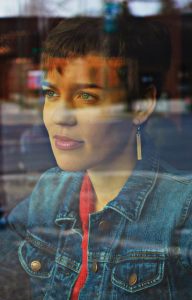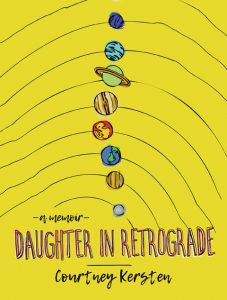Graduate Profile: Courtney Kersten, Literature Doctoral Student
Connecting with Home, Grief, and Faith through Memoir
 Courtney Kersten is a writer, teacher, and a third-year PhD Student in the Literature Department at UC Santa Cruz. She was a 2017-2018 Center for Innovative Teaching and Learning (CITL) pedagogy fellow and currently teaches in the Creative/Critical program at UCSC. This spring Kersten’s first book, Daughter in Retrograde: A Memoir, was released by University of Wisconsin Press.
Courtney Kersten is a writer, teacher, and a third-year PhD Student in the Literature Department at UC Santa Cruz. She was a 2017-2018 Center for Innovative Teaching and Learning (CITL) pedagogy fellow and currently teaches in the Creative/Critical program at UCSC. This spring Kersten’s first book, Daughter in Retrograde: A Memoir, was released by University of Wisconsin Press.
Kirstin Wagner, also a writer, teacher, and a third-year Literature PhD Candidate, was part of The Humanities Institute’s cohort of Public Fellows this year. In that role, Wagner worked with local literary journal Catamaran.
Wagner and Kersten met recently to discuss place, publishing, and two themes of Kersten’s new book: grief, and finding faith in astrology.
Kirstin Wagner (KW): As someone new to the publishing world I had the opportunity this year, through a THI Public Fellowship, to work at a local literary magazine called Catamaran. It was an exciting, instructive experience and I learned a lot about the ways in which literary journals (and indeed all sorts of publishing spaces, even large academic presses) form their own character and become a home to certain kinds of stories. I’m wondering how you went about selecting places to send this book, and how, in the end, you decided to go with University of Wisconsin press.
Courtney Kersten (CK): That’s great. Catamaran is amazing. When selecting places to send the essays that would become part of Daughter in Retrograde, I looked for journals that focused on personal narrative, such as River Teeth. When thinking about where to send the book, I felt that because the book was so Midwest-focused it made the most sense to work with a Midwest-based press. I was fortunate in that the University of Wisconsin press was willing to work with me.
I was just in Madison a few weeks ago for the Wisconsin Book Festival and was able to meet my wonderful publicist, Sheila Leary, in person. She grew up, I believe, in Rice Lake about an hour from where I grew up in Eau Claire, Wisconsin. We chatted and reminisced about growing up in that part of Wisconsin. I remember the copy editor commenting that it was clear I was from the Midwest because my line edits were “all so polite.” It was really a special experience to publish a book through a press in my home state. It felt like getting to know my home in another way.
KW: This is a book about losing your mother, but it’s also a book about (re/)learning how to inhabit daughterhood in the wake of her death. For me, the book is so much about the “daughterbody”—about the ways mother grief renders you both deeply and inescapably inside your body. As someone who also writes about matrilineal inheritance and the unmappability of “griefsense,” I am wondering about the relationships in your work between astrological narratives and the moments and memories you render. What, for you, is the language of your grief and how did you come to it?
CK: For me, the language of grief is a complex territory. I think everyone has a different experience with it. In my book, I talk about the “language of grief” as in the material (and, really, the food objects) surrounding mourning and how, in the moment, I found it so fascinating that in the wake of death people gave us casseroles, donuts, etc. Of course, these objects were given in compassion and were meant to be symbols of love/sorrow and we took them as such. But I also found it interesting that so often so much was unsaid. As in, there was no language for mourning—to really express the depth of our pain—and we instead created this dance of rituals and gifts to stand-in for everything that we could not say. Words were inadequate. But the words themselves, the trite expressions of our pain or sorrow, were also hard to say. It was a paradox. Sometimes it made me angry—why could words not sum up the extent of our pain?
I think I’ve grown friendlier with the experience of grief being something beyond language. Maybe I put too much pressure on language to sum up an experience as capacious and mercurial as grief. The experience of death, of someone “passing,” leaving this world, for me, threw me into thinking of what is beyond life, beyond language, beyond the body (where does someone go, if anywhere?)—so, of course, finding the words for it is strange.
KW: What, if any, is the ongoing legacy of this grieving process?
CK: I feel I have an internal landscape that my mother’s death has left me with. It’s kind of a language of symbols, a collection of smells, sights, and places that, upon sensing them, brush up against her memory within me. I see this thing, smell this smell, etc., and it reminds me of her and her memory pings around within me. It’s like a conversation I have with myself.
One of the best pieces of advice I was given when my mother died was not to push my grief away but to invite it in and to “sit with it” so-to-speak. So, I suppose, in that way, it’s like a friend that comes to visit and we think about my mother together: another kind of conversation between me and grief. Thinking about grief and language is funny because, as writers, we work with language—yet, the subject I’ve written so much about surpasses it. I think about it a lot.
KW: Thanks for this generous and insightful response.
I am thinking now about the ways traumatic events invite or even seem to require practices of storying as a mode of coping. Could you talk about daily astrology readings as a type of storytelling, and tell me why you chose to use them as a structural device in the book?
 CK: That’s such a great question. For me, astrology opens a passage way to envisioning new kinds of stories that your life might be creating or telling. For instance, if we look at Saturn in astrology, Saturn has a very specific kind of “story” that it can take in people’s lives that often looks very oppressive, challenging, etc. But, if we understand Saturn and what it does, we can see that the story is actually one of confronting what is limiting us so that we can live more fulfilling, happier lives. So, perhaps astrology is about diversifying narratives so that there are multiple ways to look at a situation.
CK: That’s such a great question. For me, astrology opens a passage way to envisioning new kinds of stories that your life might be creating or telling. For instance, if we look at Saturn in astrology, Saturn has a very specific kind of “story” that it can take in people’s lives that often looks very oppressive, challenging, etc. But, if we understand Saturn and what it does, we can see that the story is actually one of confronting what is limiting us so that we can live more fulfilling, happier lives. So, perhaps astrology is about diversifying narratives so that there are multiple ways to look at a situation.
I chose the structural device of the daily horoscope readings for a few reasons. First, I felt that by including the daily astrology readings I was showing multiple perspectives on my personal narrative. I may be drowning on the page but the readings are showing something else. I also wanted to model the kind of simultaneously baffling and illuminating practice that is divination. Often, in my own life, I ask a question of the tarot or I Ching and the answer immediately speaks to me. Sometimes, it is only months, or years, later that a reading will make sense. Divination is a kind of leap of faith—to trust that you are being guided even if it feels murky in the moment. Lastly, I wanted to show how, for me at least, even in moments of total chaos or devastation we are not alone, cosmically speaking. For me, this is the crux of Daughter in Retrograde. Even when you feel lost in the “deep end,” there is guidance to be found. Even when your “guide” (in this case, my mother) leaves you, there are still breadcrumbs to be found. I wanted to share this with my readers.
*
Courtney Kersten’s Daughter in Retrograde: A Memoir is available from University of Wisconsin Press.
